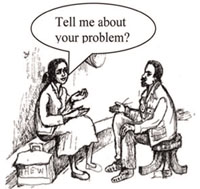11.1 General approaches to people with mental health problems

To be able to help people with a mental illness it is important to think carefully about how you approach people with mental health problems. In your practice, when you see a person with a mental illness, you may show emotional reactions, which directly or indirectly determine your approach to the client. A common response is to try to keep away or avoid them. Many people may think: ‘Why should I bother, he is mad’. However, with this approach it is difficult for clients to develop trust in you and they may therefore be unlikely to accept your help. Many clients recognise and understand your reactions and respond accordingly. If you trust them and treat them with love and affection, they will also do the same towards you. If you are helpful, they will cooperate. People with mental health problems like to be treated as responsible and respectable individuals. You should treat them as individuals who are in real need of your understanding and help. A good starting point is to ask them about their problems and listen to them patiently (see Figure 11.1).
After the client has given their version of their problems, obtain information from their family members regarding how they see the problems. If you find differences between the two accounts, do not get alarmed or angry. Draw their attention to the discrepancies and kindly request them to clarify the issues for you, so you understand their points of view. When you are interviewing the client or the family members, ask the essential questions without going into unnecessary details. It is important to develop your skills in recognising, identifying and giving care to people with mental illness. Below we outline a few key principles in how to approach people with mental health problems and their relatives.
Learning Outcomes for Study Session 11
